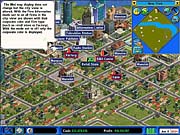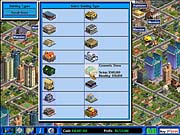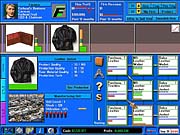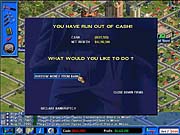Capitalism II Preview
The third game in Trevor Chan's micromanagement series is nearly here. Read our impressions of the latest build.

Trevor Chan has earned the right to put his name on the box cover of his games. Sure, the Hong Kong-based designer lacks the prestige of Sid Meier and Will Wright, but he's carved out a niche for himself by helming some of the more memorable strategy games in recent years. While the Capitalism and Seven Kingdoms series might have been cult hits rather than commercial successes, it's a sure bet that buyers didn't consider heading back to the store for a refund. Addictive play blended with outstanding depth made all four of these games instant classics.
Now the developer and his team at Enlight Software are getting back to basics with Trevor Chan's Capitalism II, the first addition to this series of award-winning economic simulations since Capitalism Plus arrived in the spring of 1997. Based on our impressions of a late beta, the new game is a complete reworking of the original that goes back to familiar territory without simply repeating the past. Although the objectives and essential elements are all back, they are being presented in a new fashion, with all sorts of additions that fully bring the world of big business and high finance to life. Economic systems are more complex; successful corporations can build massive headquarters; there are now dozens of retail businesses to operate and products to research, manufacture, and sell; a multiplayer mode has been included for the first time; and you can even top everything off by building a mansion to celebrate your worship of mammon.

Still, even with all of the new features, a lot here will be familiar to series veterans. Capitalism II seems to be pretty much the same game under the hood, inasmuch as you're still trying to make billions by establishing successful retail stores, building productive factories, and making a killing on Wall Street. Gameplay has been expanded in a number of areas, however. A configurable custom option provides for something very similar to solo skirmish play in a real-time strategy game. It gives you a chance to tweak every possible aspect of gameplay. Along with basic components like character name and portrait, you also get to choose one of eight difficulty levels ranging from 3 percent all the way to a whopping 200 percent, select the amount of startup capital, and set the number, aggressiveness, and competence of your CPU-controlled opposition. Goals can also be changed in regard to wealth and corporate status, and certain goods and industries can be excluded. So, if you've got an aversion to tobacco products, make a quick stop here before starting a game and remove all of the R.J. Reynolds wannabes from the playing field.
Online and network multiplayer support is being added to the Capitalism series for the first time. Up to seven players take part in games that can be open-ended or can feature specific goals selected before play begins. It is very similar to custom play in that many options can be changed to provide a made-to-order experience. Internet lobby support is being hosted by the matching service of publishing company Ubi Soft, so it should be fairly easy to find an opponent.
The Campaign

As much as the custom and multiplayer modes are intriguing, the heart of the game is in its two campaigns. The entrepreneur's campaign is an extended tutorial of sorts, featuring eight lessons that turn into actual scenarios once the instruction is complete. It's an excellent way to get accustomed to the concepts of gameplay before being tossed into the deep end. And it is certainly one of the most thorough and appropriately structured tutorials that we've ever seen, hitting on all of the relevant points without being overwhelming or boring--two of the capital sins in computer gaming tutorials.

Completing these instructional sessions will take many hours, as most of the objectives are extremely difficult. The real meat of this campaign begins when the pop-up menus stop and the program leaves you to fend for yourself. You start with a pair of tutorials on retail sales and then move onto more advanced topics such as manufacturing, advertising and branding, the stock market, farming, and research and development. This campaign wraps up with a "consolidation" scenario that makes you use everything you've learned and build an empire worth over $70 billion within 50 years. Needless to say, you'll be playing that one for some time. Thankfully, you can skip ahead without actually completing the final objectives in these scenarios. Just wrap up the basic lesson plan and you can move on.
The capitalist's campaign starts with five independent scenarios that have specific starting points and end goals that need to be met. Finish one and you unlock another, however, so this campaign may last for dozens of scenarios. The initial three scenarios (though the opening five can be played in any order) focus on straightforward objectives. In The World in Your Hands, you begin as an R&D specialist who happens upon an advancement in portable computing and must parlay that boon into a $400 million company in 40 years. Just Desserts gives you 50 years to expand your pastry business into other cities and rake in an average annual profit of $20 million. An explosive economy must be used in Boomtown to branch out from Seoul into other cities and create a $300 million industry within just three decades. The final two are more challenging. Drug Czar forces you to make up ground lost to your three primary competitors and become the top seller of pharmaceuticals at the end of 60 years, while Riding the Bull sees you take over a company immediately after a lucrative IPO made you promise to drive the shareholders' stock to $400 million within 30 years.
While many of these scenarios may very well be altered before the game is sent to stores, they are extremely challenging at present. Keeping your cash supply steadily flowing requires you to take advantage of every nuance learned in the entrepreneur's campaign. And though the tutorials are remarkably well done, some experimentation is required. Expect to dig deep into your personal reservoir of financial knowledge--or at least crack open a copy of The Dummies Guide to Starting Your Own Business--before feeling like you have a handle on all that is going on.
Choose Your Product

And there certainly is a lot going on here. Capitalism II could be the most advanced economic simulation ever developed. Nearly every scenario beyond the basic ones early in the entrepreneur's campaign requires you to enter half a dozen different arenas. You may start off by stocking shelves in your mom-and-pop store but are soon building factories, firing up ad campaigns and developing brand names, hiring research teams to look into ways of building a better mousetrap, playing with the stock market, mining for precious minerals and digging for oil, erecting apartment buildings, raising livestock on farms, and contemplating a mansion in which to enjoy the fruits of your labors--all at pretty much the same time in as many as four separate cities. There are dozens of items to manufacture and sell, including beds, DVD players, leather wallets, video game consoles, fruit snacks, cola, laptop computers, and so on. Raw materials run the gamut from coconut to wheat germ oil. Farms can be home to cattle, sheep, pigs, and numerous varieties of crops. And aluminum, coal, gold, silver, and silica can be mined, and timber can be chopped down.

This all sounds absurdly complicated, though Chan is making things easy on you by sticking to a few basic formulas. All of the elements in the game are based on an easy-to-learn system that uses building blocks, so when you master one, you've pretty much mastered them all. Supplying retail stores with products, setting up a head office with marketing officers and human resources departments, and even choosing to raise cattle for beef instead of milk are all accomplished by filling the same blocks with your choices. Manufacturing products is more difficult, as you often need to link two or more raw materials to get the finished item (flour, cocoa, and sugar are needed to make snack cakes, for example), though even this is fairly easy to figure out. About the only potential issue for some gamers will be the stock market. It is closely patterned after real-world investing, meaning that the marketplace is cutthroat and you'll have to devote a lot of time to learning its ins and outs.
Cutthroat is also a good way of describing the overall computer AI. Beta stage of development or not, your opposing numbers are already very astute. They will aggressively mark down products to undersell you at the sales counter. They will attempt to corner the market in certain areas and will choose to go head-to-head with you rather than back down. They will even try to buy control of your company if you get too careless with stock offerings. Forcing a competitor out of business seems to be just as satisfying here as it must be in the real world.
One aspect that isn't complicated is the presentation. Like most simulations of this type, Capitalism II has a stripped-down look and sound. Graphics are spartan, even if they are colorful and use a lot of artwork to break up the number crunching. The basic city-map screen is attractive, with moving automobiles and trucks, pedestrians hurrying down the sidewalks, and a few animated special effects livening up what could be a dull backdrop. Nothing serves to entertain our ears, as the beta is almost completely devoid of sound effects. Only an occasional sound effect interrupts the audio vacuum, which is often a touch eerie since you can see hustle and bustle on the city streets at all times. Music and sound effects are often added in the closing stages of a game's development, though, so this might change before the code is finalized.
If the nearly complete beta is any indication of how the final build will play, Trevor Chan's Capitalism II should be every bit as appealing as its two predecessors. It likely won't be for the faint of heart, or for those who experience palpitations whenever they read the word "micromanagement," though serious virtual financiers might find themselves in economic-simulation nirvana. The game is scheduled to ship to retail stores on December 11.
Got a news tip or want to contact us directly? Email news@gamespot.com
Join the conversation